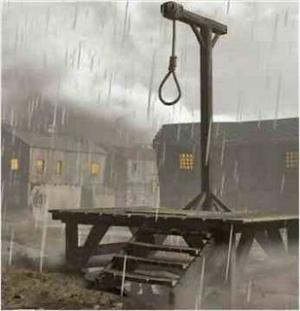Take the Condemned Spies to the Gallows, Period

Almanar.com, 22 July 2010

Is there not some chosen curse, some hidden thunder in the stores of heaven, red with uncommon wrath, to blast the man who owes his greatness to his country's ruin? (Joseph Addison, 1672 -1719)
Treason and collaboration with the enemy has probably been the most crucial element to decide who wins and who loses in the game of the nations. "Israel" is losing this game with Lebanon the hard way, because of an atmosphere that relatively fosters collaborators.
In peace or war, spies are traitors and they should get the maximum penalty according to the constitution of every country: death or life in prison.
The case is the same here in Lebanon, although it's a little more complicated.
More than a thousand people have been sentenced to death since independence in 1948. Only 50 have been executed, including 17 after the 1989 Taef Accord which ended the civil war. They were mainly convicted with murder.
In the past couple of years, security forces nabbed dozens of Lebanese spies working for the "Israeli" Mossad; some had played roles in the spree of assassinations following the 2005 murder of former PM martyr Rafiq and other had specific jobs before, during, and after the 2006 war on Lebanon.
Death sentences have been given to at least three spies this year. Many more such sentences are expected to follow shortly. Other collaborators who fled to "Israel" in 2000, like the head of the South Lebanon Army (SAL) Antoine Lahed, were tried in absentia and also sentenced to death. Those who were handed by the Islamic Resistance to the Lebanese army that same year, were given very minimum sentences calculated in months.
Lebanese President Michel Sleiman stressed that he will not hesitate to sign any death sentence to make it effective.
As much as it seems encouraging to counter "Israeli" espionage in Lebanon, these measures could prove futile in case of two scenarios:
1- If the sentences were not executed for whatever reason.
2- If the fostering environment continues to exist giving Mossad spies a safe haven.
"Do not play with security or the judiciary on the basis of religious or sectarian balance. Start executing Shiite collaborators first. Collaborators do not belong to confessions and sects; they don't even belong to their families. They only belong to "Israel"," Hizbullah Secretary General Sayyed Hassan Nasrallah said in his last speech this month.
Sayyed Nasrallah's remark included warnings against what has been known in Lebanon as "confessional and sectarian balance."
Governmental, official, military, administrative, and practically everything here is founded on quotas; Muslims get this and Christians get that...Maronites get to be presidents, Shiites get to be House Speakers, and Sunnis get to be prime ministers. There is growing concern in Lebanon that sending the spies to the gallows would have to adhere to this balance.
Responsibility lies on the shoulders of the political authority.
"There has been leniency on the part of the judiciary. For instance, after the 2000 liberation, courts in Lebanon gave the families of the collaborators - who were serving minimum time in jail - authorization to collect compensation from "Israel" worth 25 thousand dollars, and this was tantamount to encouraging people to collaborate with an enemy state," Ibrahim Awada, a Lebanese attorney told Al Manar Website.
Section 273 of the Lebanese law, however, stipulates that every person who carried arms with the enemy shall be sentenced to death. Yet SLA collaborators, who served "Israel" for 22 years and had Lebanese blood on their hands, were given minimum sentences varying between one month and three years in jail.
What's even worse, continued Awada, "if it was not for Hizbullah members of parliament back in 2002, a draft law to cut the collaborators' sentences to half would have passed."
Tolerance is definitely not the word to describe the relation between the state and the traitors.
"The political environment is encouraging collaboration with "Israel"," former head of the Military Court in Lebanon, Brigadier General Judge Maher Safiyyaddine, told Al Manar Website.
"A large portion of those who were sentenced in 2000 have been under surveillance and they have not returned to establish contact with the enemy. However, the main problem lies with the spies that are being nabbed today and who had formed what is known as ‘"Israel's" sleeping cells'," Safiyyaddine said.
The former military judge stressed the political atmosphere that prevailed in 2005 after the assassination of PM Hariri, and ultimately after the Syrian forces pulled out of Lebanon, had given the "Israeli" enemy a strong foothold in the country. He reminded that even "Israeli" reporters were confident enough to come to Lebanon, interview people, take some shots, and then get back to "Israel".
When spy Charbel Qazzi was arrested two weeks ago by the military intelligence, a chorus of Lebanese politicians and party leaders led a campaign against the army for many reasons, including ‘the inappropriate way to arrest a Lebanese citizen!"
Others like post allies to "Israel" during the civil war even defended Qazzi.
The spy's confessions to have been a Mossad agent for 14 years in the sensitive sector of telecommunications was nothing compared to the story of Tareq Raba'a, another spy who works for the same telecommunications firm, Alfa.
Qazzi and Raba'a's arrests were only a couple of days apart.
In front of this dramatic development, the anti-Lebanese Army rhetoric eased down relatively, and instead focused on "leaks" to the press about interrogations with the spies. Still, politicians have been amazingly divided on the issue of spies and collaborators.
It is understandable that greedy politicians make ugly mistakes for personal interests. It is understandable that politicians engage in wars of words over a variety of issues. But it is not understandable how politicians in Lebanon can be divided over whether to keep Lebanon vulnerable and exposed to "Israel's" fangs or not. This is surely not related to personal interests. This definitely has got to do with the game of the nations; or maybe the game of the one big nation and it proxies in our region. Spies should be taken to gallows and this nation must be saved, period.




